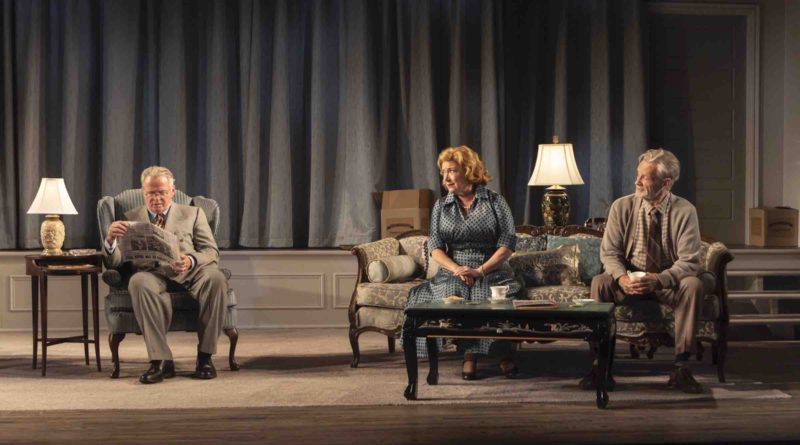REVIEW: ‘The Young Man From Atlanta’ at Signature Theatre
Photo: The Young Man From Atlanta stars, from left, Aidan Quinn, Kristine Nielsen and Stephen Payne. Photo courtesy of Monique Carboni / Provided by BBB with permission.
Horton Foote was an American playwright who crafted seemingly simple, but deeply profound dramas about families and communities trying to survive, thrive, cope and find meaning in life. From The Trip to Bountiful to Dividing the Estate, Foote’s oeuvre was impressive and included many interconnecting storylines and characters.
One of his most celebrated works — a Pulitzer Prize winner for drama, in fact — is The Young Man From Atlanta, which is currently being given a first-rate revival by Signature Theatre, Foote’s off-Broadway home for many years.
Starring the dominating Aidan Quinn and the incomparable Kristine Nielsen, the two-hour production deals with a married couple coming to terms with the death of their adult son. Nielsen’s character of Lily Dale Kidder is still heartbroken over her son’s drowning in a lake, although there’s a theory that he made have died by suicide. She yearns for him to return and holds on to his memory as best she can. The despair she feels, quite authentically, has changed everything about her life, including her inability to play the piano anymore.
On the other hand, Quinn’s character of Will Kidder tries to keep memories of his son to a minimum. Instead, he busies himself with work and the purchase of a new house. He is a fast-talking Houston businessman who identifies himself by his profession, which makes the fallout from the opening scene so difficult for him: He’s let go from his job as a higher-up for a grocery store chain.
Now, Will is sent home with no job, no son and no seeming purpose in life. As he spends more time with Lily Dale and her stepfather, played by the wonderful Stephen Payne, Will finds himself surrounded by young men, and he is constantly reminded of his aging body and the ravages of Father Time. He lost a young man as a son, he is replaced at the company by a young man, his wife’s stepfather has a young man visiting in town, and, worst of all for him, Lily Dale has been meeting with their deceased son’s good friend, another young man.
This last young man is someone Will has no interest in seeing. He met him at the funeral and has fielded many phone calls from him over the past few weeks, but he is uninterested in helping his deceased son’s friend, with money or emotional help.
As Will continues to resist meeting with this friend, one begins to see the truth emerging. The Kidders’ son was gay, and this young man from Atlanta was his partner. But these are conservative times — middle of the 20th century, deep in Texas — and having a gay son is a reality that Will will not confront. Lily Dale is more open to the idea of helping this young man, but Will wants nothing to do with him.
This drama, which deals with big events in a subtle way, is powerful because of the acting performances from each member of the ensemble. Quinn finds a nice balance of anger, professionalism, sternness and close-mindedness. He’s hurting on the inside, but his priorities seem amiss — almost as if he values his job more than his son.
Nielsen, one of the best stage actors of her time, is turning in an effective and heart-wrenching performance. Lily Dale is a difficult role to play because the part requires a lot of reflection, crying and stares into the distance. Her hopes are continually dashed as she realizes her son is not coming back, and her son’s partner is not welcomed into the household. She seems to latch on to the youth around her because it reminds her of her only child.
Payne, with his gruff, cowboy-esque voice, offers an effective portrait of a man eternally stuck in the middle. He is willing to give money to Will to help him after the loss of his job, and he’s also willing to fund Lily Dale’s financial help to this young man from Atlanta. He only has $35,000 to his name, but he is kind and giving with the small lot he has built over time.
Supporting work helps the play achieve its full-bodied poignancy: Devon Abner, as Will’s boss; Dan Bittner, as the young man taking Will’s job; Pat Bowie, as the Kidders’ former maid who has fond memories of their son as a baby; Harriett D. Foy, as the Kidders’ current maid; and Jon Orsini, a distant relative. There’s also a sub-theme involving the hypocrisy and discrimination faced by these two African-American maids, who have largely raised the Kidder son and taken care of the family during this difficult time. Again, this is the middle-of-the-century South, so there are a lot of uncomfortable and disheartening realities for these characters.
Jeff Cowie’s set has some interesting elements, and the décor from the 1950s is a nice touch. It’s difficult to believe the Kidders’ would have two staircases and two doors evenly separated from each other; that design element seems more out of convenience for staging entrances and exits than actually approximating reality.
The Young Man From Atlanta, directed by Michael Wilson and playing through Dec. 15, is a drama that offers a walloping punch in a quieter, more devastating form. Foote was able to showcase a family coming undone because of unspoken truths that eat away at the soul, and the lessons, unfortunately, seem still appropriate for these times.
By John Soltes / Publisher / John@HollywoodSoapbox.com
The Young Man From Atlanta, written by Horton Foote and directed by Michael Wilson, stars Kristine Nielsen and Aidan Quinn. The production continues at Signature Theatre on 42nd Street in New York City through Dec. 15. Click here for more information and tickets. Rating: 




